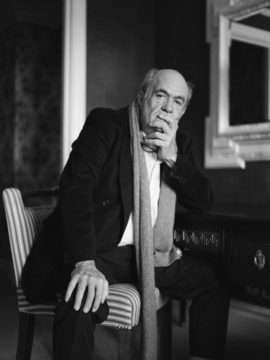Leo Robson in New Statesman:
 In conversation, the Irish writer Colm Tóibín, the winner of the 2021 David Cohen Prize for Literature, employs a range of corroborating gestures. During moments of leisurely explanatory flow, he uses the back of his right hand to fondle the air just in front of him, or to fold it in gentle Nigella-ish revolutions. When he wants to achieve a tone of emphasis, a stab of the index finger accompanies every carefully chosen word. In more pensive moments, he likes to stroke his head, which is bald except for tufts around the back and side in the manner of his hero Henry James, the subject of his novel The Master (2004). On a recent afternoon, sitting in a library-like, though bookless, room in a small central London hotel, he preferred to lean forward from his armchair, arching his noble lined face towards the coffee table that lay between us – a disposition that reflected the infinite seriousness with which he takes “the creation of character and setting of scenes”.
In conversation, the Irish writer Colm Tóibín, the winner of the 2021 David Cohen Prize for Literature, employs a range of corroborating gestures. During moments of leisurely explanatory flow, he uses the back of his right hand to fondle the air just in front of him, or to fold it in gentle Nigella-ish revolutions. When he wants to achieve a tone of emphasis, a stab of the index finger accompanies every carefully chosen word. In more pensive moments, he likes to stroke his head, which is bald except for tufts around the back and side in the manner of his hero Henry James, the subject of his novel The Master (2004). On a recent afternoon, sitting in a library-like, though bookless, room in a small central London hotel, he preferred to lean forward from his armchair, arching his noble lined face towards the coffee table that lay between us – a disposition that reflected the infinite seriousness with which he takes “the creation of character and setting of scenes”.
“What you do,” he told me, at a moment of near horizontality, “is play to your strengths. But you keep not knowing what your strengths are.” He was talking about the evolution of his latest book, The Magician, a kind of sibling to The Master, which follows the German writer Thomas Mann virtually from cradle to grave. “You keep thinking, ‘I must be deep, I must be deeper.’ Then you say, stop this nonsense, get on with the story.” Eventually, he decided that he was “creating an illusion. The effort is to be immersive, so the reader can live this life emotionally, in a vicarious way.”
Tóibín was born, 66 years ago, to a conservative Catholic family, in Enniscorthy, County Wexford. His grandfather was an IRA member who took part in the Easter Rising. His father, a teacher, died when he was 12. As a teenager, at boarding school, Tóibín discovered literature and realised he was gay. After graduating from University College Dublin he moved to Barcelona, inspired partly by his love of Ernest Hemingway, in the final days of Franco, when the city was blooming with new freedoms.
More here.
